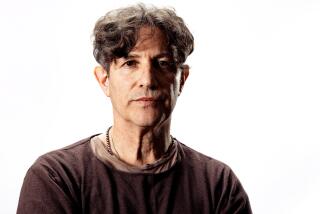Transcendent, wrenching ‘Balthazar’
Some years before he died, the French director Robert Bresson gave an interview to film critic Michel Ciment. Bresson was in his early 80s and had recently completed “L’Argent.” The film, Bresson’s last, concerns a man who commits a murder for money but like many of the director’s stories is essentially about the crimes committed against the soul.
“The only things that matter are invisible,” Bresson told Ciment. “Why are we here? What are life and death? Where are we going? Who is responsible for the miracle of animal and vegetable life?”
I don’t have a clue about the last three of Bresson’s questions, but I’m certain that an answer to the first can be found in his work. Among the greatest filmmakers of the last century, Bresson is one of the few directors for whom cinema was both an aesthetic and spiritual pursuit, a search that was reflected in films for which the words “sublime,” “transcendent” and “masterpiece” can seem somehow lacking. That his 13 features remain largely unknown and unavailable in this country (only one is available here on DVD) is a measure of our impoverished film culture and a reason why one of the heroes of the movie year is Rialto Pictures, the New York distributor reissuing Bresson’s “Au hasard Balthazar.” The film opens today at the Nuart and there is no more important movie in theaters.
Released in 1966, “Balthazar” tells the wrenching story of a donkey and the country girl who grows up with him, Marie (Anne Wiazemsky, who was then, like most of Bresson’s actors, a nonprofessional). The film opens with a young donkey being taken in by a farmer as a pet for his children, including his ailing daughter. Marie, the daughter of a schoolteacher, lives with her family in a house owned by the farmer. Her closest companion is the farmer’s son, Jacques, with whom she shares a child’s romantic passion. After Jacques’ sister dies, the farmer moves his family away, leaving behind Marie’s family and the donkey, whom the children have christened Balthazar. Time passes and Balthazar is sold to a succession of owners, undergoing a crucible of suffering that parallels that of Marie.
With “Balthazar” Bresson wanted to tell the story of human vice, as told through a donkey who represents both purity and sexuality. The donkey, Bresson said, “has in his life the same stages as does a man, that is to say, childhood, caresses; maturity, work; talent, genius in the middle of life; and the analytical period that precedes death.” During his short, hard life, Balthazar moves from one group of inattentive owners to the next and in his passage suffers from what makes us suffer, including pride, lust and greed. Marie’s father sells him to work at a bakery, where he’s abused by a thug in a motorcycle jacket. Later, Balthazar passes into the cruel, careless hands of a miser, who flogs the animal as it walks around a mill, pumping the costly mineral water so beloved by the French.
Village Voice critic J. Hoberman has observed that “Balthazar” is about a donkey in the way “Moby-Dick” is about a whale. Melville’s novel is certainly about an animal -- its meat, its appetites, its terrifying power -- but it is also about heroic struggle, a search for faith and man’s drive to dominate the natural world. “Moby-Dick” is also, importantly, about its author’s own heroic and triumphant effort to wrench something great out of his creative consciousness, which echoes Bresson’s struggle to turn movies into art. But whereas with “Moby-Dick” Melville could achieve greatness by fusing different literary forms, Bresson believed cinema could achieve the condition of art only if it did not mimic literature and theater. His aspiration was nothing less than pure cinema.
That sounds daunting and dusty in the manner of three-hour art movies, but Bresson’s films are models of aesthetic economy (“Balthazar” runs a fleet 95 minutes). Stripped of narrative fat and yet filled with meaningful event, the films possess a rigor that seems ascetic by our busy standards. The director was fond of photographing hands -- he posed them with the care of a Renaissance painter -- and he liked to show people passing through doorways amid coming and going. If in Bresson’s films nothing ever seems out of place or superfluous it’s because he strove to find the essential truth of the image. Not an image or sound is wasted -- or offered up in self-glorification -- and from such seeming simplicity there arises a world of feeling.
One of Bresson’s self-directed dictums was to “hide the ideas, but so that people find them. The most important will be the most hidden.” In “Au hasard Balthazar,” some of the most important and hidden of those ideas concern faith and the fallen world. For much of film history, moviegoers regularly talked about what was once somewhat quaintly called “the seventh art.” It’s rare today that movies and art are discussed in the same breath, proof perhaps of another fallen world. The relentless commercialization of movies is understandable; people get rich off movies and all power to them. But there are other kinds of movies, and while it is no longer fashionable to talk about those that stir you -- those movies you carry inside you and that press on your chest -- they exist nonetheless.
*
‘Balthazar’
MPAA rating: Unrated.
Times guidelines: Some animal cruelty, sexual violence.
Anne Wiazemsky...adult Marie
Walter Green...adult Jacques
Francois Lefarge...Gerard
Pierre Klossowski...the grain dealer
Jean-Joel Barbier...the priest
Writer-director Robert Bresson. Released by Rialto Pictures. In French, with English subtitles. Running time: 1 hour, 35 minutes. Exclusively at Landmark’s Nuart, 11272 Santa Monica Blvd., (310) 478-6379.
More to Read
Only good movies
Get the Indie Focus newsletter, Mark Olsen's weekly guide to the world of cinema.
You may occasionally receive promotional content from the Los Angeles Times.







